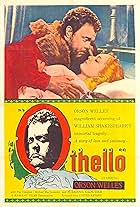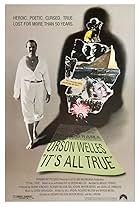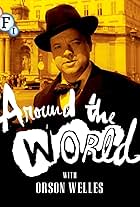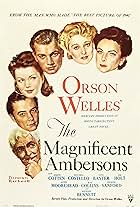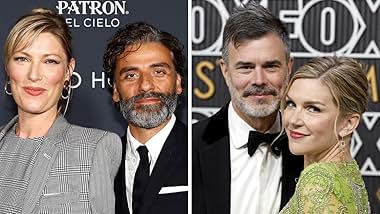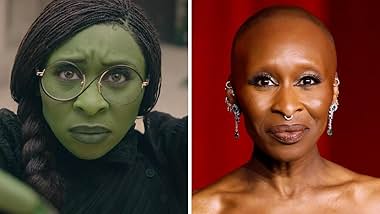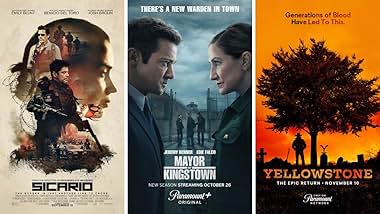Essay film shot for TV including Orson Welles reflections on Othello close to the Moviola, a chat with Hilton Edwards and Micheál MacLiammóir and fragments of a conversation with the audienc... Read allEssay film shot for TV including Orson Welles reflections on Othello close to the Moviola, a chat with Hilton Edwards and Micheál MacLiammóir and fragments of a conversation with the audience in Boston after a screening of the film.Essay film shot for TV including Orson Welles reflections on Othello close to the Moviola, a chat with Hilton Edwards and Micheál MacLiammóir and fragments of a conversation with the audience in Boston after a screening of the film.
- Director
- Writer
- Stars
- Awards
- 1 nomination total
- Director
- Writer
- All cast & crew
- Production, box office & more at IMDbPro
7.4567
1
2
3
4
5
6
7
8
9
10
Featured reviews
Orson Welles at his best
This is just a wonderful doc on the making of Orson Welles's Othello. It's basically Orson Welles telling anecdotes about Othello for one hour, but the man is so captivating, funny, intelligent, charming and charismatic that is just a joy to watch for any film buff.
The man's a joy to listen to
The last film Orson Welles completed during his lifetime is this documentary made for German television about the making of his film of "Othello". (It was intended to be the first in a series, but no further films were made.) Most of the film is Welles sitting and talking to the camera, but footage of a discussion he had with the film's co-stars Micheál MacLiammóir and Hilton Edwards (friends that go back to Welles's earliest days working in theater in Dublin) and a Q&A session after a showing of "Othello" are dropped in.
Welles is a real raconteur and an utterly fascinating guy to listen to, so this film can't help but entertain. Besides talking about the circumstances of making "Othello", he talks a lot about the meaning of the play.
Highly recommended.
Welles is a real raconteur and an utterly fascinating guy to listen to, so this film can't help but entertain. Besides talking about the circumstances of making "Othello", he talks a lot about the meaning of the play.
Highly recommended.
Hate to Admit It, But.....
THE PLOT:
Filming Othello begins with Welles standing behind a moviola. He directly addresses the camera and announces: "This is to be a conversation, certainly not anything so formal as a lecture, and what we're going to talk about is Othello, Shakespeare's play and the film I made of it." Welles initially conducts a monologue where he recalls the events that lead up to the creation of Othello and some of the problems that plagued the production. Later, three men talk at length about the making of Othello. Welles then resumes his monologue from his position behind the moviola.
I'm a huge fan of Welles and I have everyone of his works -- including fragments. Always enjoyed his TV appearances.
That said, I have to admit this movie bored the heck out of me. 90 minutes of Welles yapping about stuff we already know is sleep producing. So disappointing.
I'm a huge fan of Welles and I have everyone of his works -- including fragments. Always enjoyed his TV appearances.
That said, I have to admit this movie bored the heck out of me. 90 minutes of Welles yapping about stuff we already know is sleep producing. So disappointing.
In Welles' last completed film (I think), he talks us through his 1952 version of Othello, giving new insights and somehow making it work.
It's odd now to think of this film and know that I really did enjoy it. I had the pleasure a few years back at the Seattle Art Museum. For the most part, the film is Welles and two old friends/actors from the original film sitting around a table and talking about filming Othello and past life experiences. And somehow it worked. Which proves Welles' genius, even in these conditions he could make a great film. It looks as though it was filmed in his living room, which is a sad reminder of the treatment he got in the last 20 (40?) years of his life. Although, like most Welles fanatics, I am eagerly awaiting the chance to see "The Other Side of the Wind", this is really a film worthy of his talents and, on many levels, an appropriate last film.
A wonderful, gentle coda to a boistrous film career.
A wonderful, private oration with Orson Welles for once talking about his vast visual artistry and visual imagery. Welles always shied away from discussing such things, that his fans would have much loved to hear. During his conversations with Peter Bogdanovich which became "This is Orson Welles," he speaks as if his visual style never had any thematic significance. It is wonderful to hear him finally talk about style and vindicate one for taking such joy in his visual motifs.
In the second half of the movie, Welles discusses the elements of the film which were dictated by practicality and necessity. Welles had to procure the funds for his Othello entirely himself, either from being paid to appear in other mens' movies, or from the odd backer who would contribute not nearly enough money. This meant production had to keep stopping and relocating across the world. Orson Welles was the first person in the history of cinema to make a movie not attached to a certain studio or even country! When it came to the Cannes film festival, Welles was stuck with what country to say the movie was of! He chose Morrocco for convenience, ironically where the character Othello was originally from. This makes Orson Welles' Othello the very first independent film, and Welles went on to become the founder of the independent film movement.
Also included is a reunion luncheon party with Hilton Edwards (Desdemona's father) and Michael Macliammoir (Iago). Following, Welles further discusses the play of Othello, performs a couple of key speeches from the play. The final segment is from a question time after a screening of Othello to film students.
As always, hearing Orson talk is marvellous to listen to. A wonderful, gentle coda to a boistrous film career.
In the second half of the movie, Welles discusses the elements of the film which were dictated by practicality and necessity. Welles had to procure the funds for his Othello entirely himself, either from being paid to appear in other mens' movies, or from the odd backer who would contribute not nearly enough money. This meant production had to keep stopping and relocating across the world. Orson Welles was the first person in the history of cinema to make a movie not attached to a certain studio or even country! When it came to the Cannes film festival, Welles was stuck with what country to say the movie was of! He chose Morrocco for convenience, ironically where the character Othello was originally from. This makes Orson Welles' Othello the very first independent film, and Welles went on to become the founder of the independent film movement.
Also included is a reunion luncheon party with Hilton Edwards (Desdemona's father) and Michael Macliammoir (Iago). Following, Welles further discusses the play of Othello, performs a couple of key speeches from the play. The final segment is from a question time after a screening of Othello to film students.
As always, hearing Orson talk is marvellous to listen to. A wonderful, gentle coda to a boistrous film career.
Did you know
- TriviaOrson Welles reportedly shot a few scenes of him traveling in Venice explaining his "Othello (1951)." This footage has been lost.
- ConnectionsFeatured in Magician: The Astonishing Life and Work of Orson Welles (2014)
Details
Contribute to this page
Suggest an edit or add missing content











